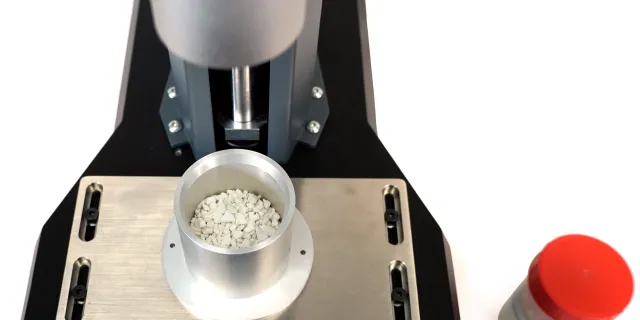
Granule hardness test


Solution
- Software-controlled test stand
- Custom succulometer-based fixture repeatedly apply the compressive load
Benefits
- Easy-to-use test procedure
- Reliable and repeatable methodology used 20 times per batch
- Comparative data available to improve processes
he test solution allows us to assess the ability of our potassium sorbate suppliers to provide a grade that will not physically deteriorate through blending and storage, yet will enable us to extend the shelf life of our products, whilst enjoying the savings from reduced manufacturing costs. Mecmesin were exceedingly helpful at first contact and were very knowledgeable and professional throughout the process of test development. The company made great effort to ensure we achieved a working, reliable, repeatable and reproducible system that met all our requirements at a sensible price.
Gordon Marley, Senior Scientist - R&D
Ecosyl
Requirement
Ecosyl Products Limited is one of the world's leading companies involved in the sales and marketing of forage additives for the agricultural industry. Ecosyl uses its own patented production technology to produce a range of silage additives.
Ecosyl scientists wanted to be able to assess the potassium sorbate they receive from suppliers, in order to increase the shelf life of products and ensure their physical integrity throughout the production process. This required a hardness test to be performed on multiple granule particulates.
Solution
Mecmesin worked with Ecosyl to create a suitable test solution, consisting of a MultiTest 2.5-i computer-controlled test frame, fitted with a 2500 N loadcell and specially adapted succulometer. The succulometer comprises a heavy duty cylindrical vessel with corresponding plunger to effectively compress sample products.
To perform the hardness test, a fixed weight of 20 g (granules) is placed within the succulometer and compacted to its maximum displacement at a 2400 N force reading. This is repeated a further 20 times, per batch, for comparison analysis. Sample hardness can be seen graphically as the area underneath the displacement curve.
The MultiTest-i was selected through its ease of operation, accuracy, repeatability, ability to display data graphically on a PC and export results directly to Microsoft™ Excel. This solution would now be implemented with an OmniTest UTM and VectorPro software for state-of-the-art compression testing.
Test equipment
- MultiTest 2.5-i computer-controlled test system rated to 2500 N
- ILC-S 2500 N loadcell
- Modified succulometer














